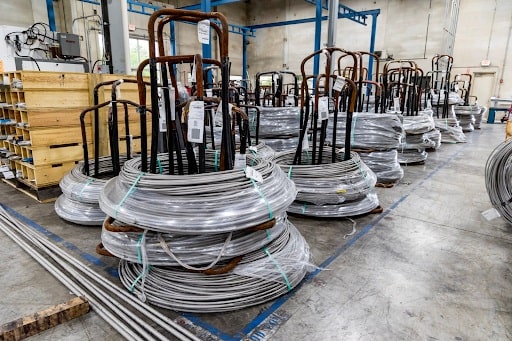Plastics are synthetic materials that have been engineered to possess a range of specific properties. Due to these properties, plastics are widely used in many different industries including the construction industry.
Plastics can be used in construction in a variety of ways, such as in piping and ductwork, as insulation, or as part of prefabricated components. Plastics offer many advantages over traditional construction materials such as metals, wood, and concrete.
Here, we explore the use of plastics in the construction industry, focusing on the advantages that they offer.
Prefabricated Components
Injection molding is a manufacturing process that involves injecting molten plastic into a mold. The main benefit of plastic injection molding in construction is that it allows for the mass production of prefabricated components. This is beneficial because it reduces the overall construction time of a project.
Injection molding offers several advantages, such as being able to produce complex shapes, having a short lead time, and being relatively cost-effective. This manufacturing process is also very versatile, as it can be used to create a wide variety of different plastic products.
In addition, injection molding can be used to create a variety of different plastic products, which gives construction companies more flexibility in terms of the materials they use.
Plastics in Piping and Ductwork
One of the most common uses of plastics in the construction industry is piping and ductwork. Plastics are often used in piping applications because they are lightweight and easy to install.
Plastics are often used to insulate ductwork because they are good at preventing heat transfer. This is important in ductwork applications where hot or cold air is being transported, as it helps to ensure that the air temperature remains consistent.
Ductwork made from plastic is often used in HVAC systems because it is lightweight and easy to work with. In addition, plastic ductwork does not rust or corrode like metal ductwork. It is also less likely to suffer from leaks.
Insulation
Plastics offer a variety of benefits as an insulating material, such as being lightweight, easy to install, and having a high R-value (thermal resistance). It helps to keep homes and buildings warm in the winter and cool in the summer.
Plastic insulation is often used in walls, ceilings, and floors. It is also used to insulate piping and ductwork. In addition, plastic insulation can be used in electrical applications, such as wire and cable insulation.
Plastics are also highly resistant to moisture and mold, making them an ideal choice for use in damp or humid environments. It is also fire-resistant, which is an important consideration in many construction applications.

Floor Covering
Plastic is also commonly used as a material for floor coverings. Floor coverings made from plastic are often used in commercial and industrial applications because they are durable and easy to clean. Plastic floor coverings are also slip-resistant, making them ideal for use in wet or oily environments.
Floor covering is a part of the construction process that involves covering the floor with a material such as a carpet, tile, or vinyl. Vinyl is a type of plastic that is commonly used in floor coverings. Vinyl is durable and easy to clean, making it an ideal choice for use in high-traffic areas. In addition, vinyl is resistant to moisture and has a long lifespan.
Profiles (Windows and Doors)
In the construction sector, plastics are frequently used in the form of profiles. Profiles are used to create a variety of different shapes and sizes, which can be used for a variety of purposes. For example, profiles can be used to create window and door frames, as well as to create moldings and trim.
Windows and doors made from plastic are often used in commercial and industrial applications because they are durable and easy to maintain. In addition, plastic windows and doors offer good insulation properties, making them ideal for use in cold climates.
It is also common to find plastic windows and doors that are impact-resistant, making them a good choice for use in areas where there is a risk of breakage.
Bottom Line
Plastics offer a number of advantages that make them an ideal material for use in the construction industry. These advantages include being able to mass-produce prefabricated components, having a short lead time, being relatively cost-effective, and being highly versatile. Plastics offer good insulation properties and are resistant to moisture and mold. They are also fire-resistant and impact-resistant.
If you’re considering using plastics in your next construction project, we suggest contacting a plastic supplier to learn more about the different types of plastics that are available and the advantages that they offer.





























